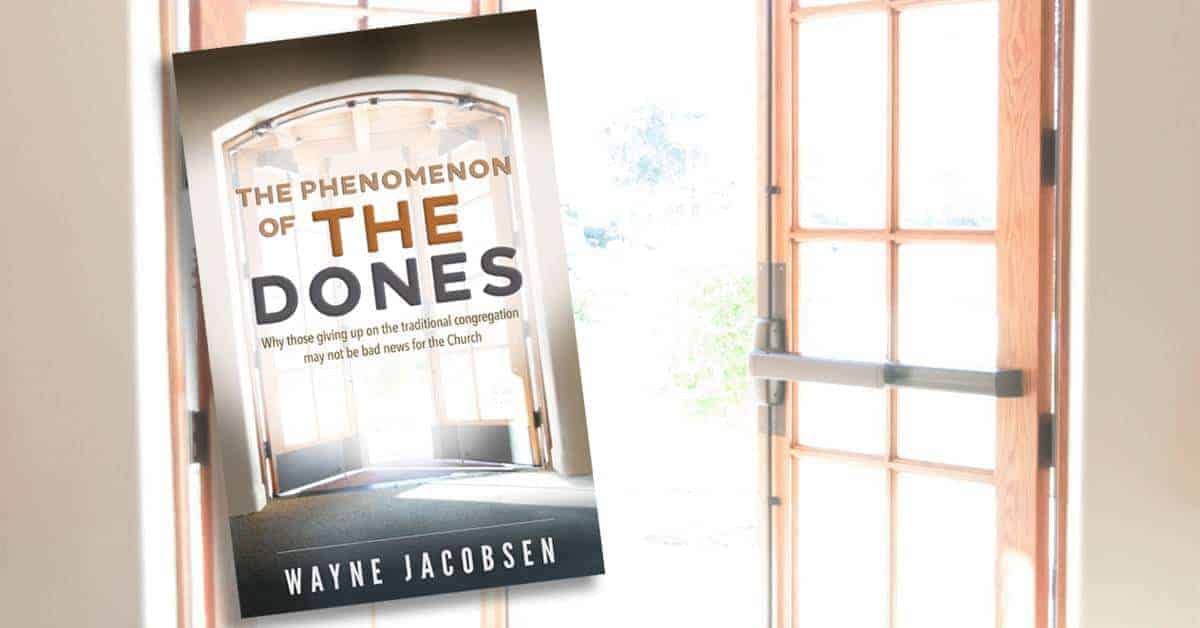Monetizing Ministry
By Wayne Jacobsen in a continuing series on The Phenomenon of the Dones. You can also read this blog in Spanish: Monetizando el Ministerio.
“Follow the Money!”
Since Watergate it has been the prevailing wisdom to ferret out excess and corruption in our treasured institutions. There is something about money, especially in huge amounts, that causes people to justify compromising their integrity by making personal gain more important than the Father’s purposes.
As an increasing number of people are disillusioned with the abuse and excesses of our religious institutions many also have a growing awareness that those same institutions have strayed from the purity and simplicity of devotion to Christ. Perhaps they need to look no further than how money and high finance have corrupted the authenticity of the Gospel. When someone or an institution makes their livelihood from the God’s things, it is easy to be seduced into thinking that serving their bottom line also serves the work of Christ.
And while I’m not suggesting it is wrong for people to make their living from their ministry I don’t think we are critical enough in assessing how often the best economic choices are at odds with how God works and thus end up distorting the Gospel even as we claim to follow it. Why have we committed the vitality of his kingdom to the same business models used by every other human enterprise in the world and what are the consequences of doing so?
Isn’t that why we have ended up with a plethora of religious institutions that are more often preoccupied with their own power and security than they are demonstrating Christ’s love in the world? Some would argue that the religious industry we created is just a natural extension of the things Jesus taught, and the way to get his message in the world. However, the excesses and distortions of our institutions say otherwise and many have grown unchecked for centuries. Is it just coincidence that our large institutions pay exorbitant salaries to those at the top or can justify harming others to protect themselves and their organization?
In my last article on this series I concluded that the reason we have more large-scale meetings about the life of Jesus when personal conversations can be far more fruitful, is because we don’t have a business model that undergirds more personal connections. We have an industry for teachers and writers that rewards those who are successful at leveraging the marketplace for money and influence. But not all that influence has reflected well the nature and message of Christ.
Jesus warned us that the reality of his kingdom would not mix well with the human thirst for money and power. The ability for any of us to believe something just because it is in our self-interest is well documented in psychological testing. I’m not talking here about people who deceive others for money, but our ability to convince ourselves something is true that isn’t, so long as we profit enough for doing so. And the more money involved, the easier it is to deceive ourselves and others around us. It’s called cognitive dissonance where we justify what we know is wrong because we feel as if we have to.
I used to teach tithing as a New Testament mandate. I grew up with that conviction and had no problem making that conclusion from Scripture when my salary was drawn from those to whom I taught it. Only when my income was no longer attached to other people’s tithes could I begin to see that God’s purpose in the new covenant was not the obligation of tithing but joy of generosity that would spill out of our hearts. Tithing is a cheap substitute in that light.
The Gospel as a Gift
Monetizing anything changes the nature of it. I’ve watched the apps on my smartphone or websites I frequent all become worse when the goal is to monetize it rather than provide the service for which it was originally intended. Who even remembers Facebook when it was just information about your friends rather than an endless string of advertisements and political posturing? Nothing is made better by monetizing it; in fact it often becomes twisted by benefiting the provider more than the one it was meant to serve. Nowhere is that more true than the Gospel.
When Lewis Hyde wrote about Alcoholics Anonymous (AA) in his classic book on creativity, The Gift, he pointed to one of its characteristics that has assured not only its effectiveness but also it’s longevity: participating is AA free, and it always has been. Nothing is bought or sold; no one makes his living from facilitating its meetings. “Local groups are autonomous and meet their minimal expenses—coffee, literature—through member contributions. Those grateful for the impact it has had on their lives, volunteer their time to help others. Hyde concluded, “AA probably wouldn’t be as effective, in fact, if the program was delivered through the machinery of the market, not because its lessons would have to change, but because the spirit behind them would be different.” He asserts that the gift may be the actual agent of change, and that selling a transformative gift falsifies the relationship between the two parties.
Do you hear Jesus’ words, “Freely you have received, freely give,” running through your mind? I do. What would the church of Jesus Christ be like today if it had followed AA’s model of generosity and volunteerism instead of McDonald’s model of franchise marketing? Even AA’s approach has been corrupted when congregations make it part of their ministry with a staff position and a line item in the budget. Though it starts out having a profound impact on lives, it often ends up an object of conflict and competition as people fight for position and ownership.
Part of the reason we have so many different religious institutions has to do with contest for money and power. The larger they grow the more demand there is to protect and provide for the machinery. Jealousies and power struggles are the natural result and the disaffected go off to start their own. We prove we’re businesses when we labor under the ultimatums of large donors, or force departing pastors to sign non-compete clauses to get their severance pay. Once someone has to be paid a salary, or buildings have to be provided, the decision-making revolves around economics and nothing distorts the life of Jesus more quickly than the business model, flow charts, and insatiable need for money. It is no longer a gift; it’s a big business with many depending on its sustenance and growth. Our entire religious system is built that way from seminaries, to churches and publishers.
Jesus said it was impossible to serve God and money. We think we can blend them without consequence but money always wins out, even among those that start out with the loftiest ideals. Money blinds us to the ways God works and the need for it pressures us to do what we wouldn’t otherwise freely choose to do. I know pastors who walk on eggshells each week, knowing they can’t honestly share their journey and not run into trouble with some faction in the church. I worked with a publisher that wanted me to change the content of He Loves Me so the freedom it espoused wouldn’t threaten pastors and they would be more inclined to read it from their pulpits and an editor that wouldn’t print an article I’d written even though he loved it because it might offend the subscriber base and they would cancel their subscriptions. We all know even a few percentage point decline in offerings or subscribers can mean spell a quick end to many of our institutions.
I know that’s hard to see from the inside. Everyone thinks they are doing God’s will as best they know how, rarely considering how much their need for income shapes their actions. I’ve told many a pastor who is critical of those who are done with their congregation, “If you could just step away from all of this for two years, you would be shocked at the things you’d discover when money no longer influences your ministry.” I had no idea myself how much the economic religious systems we’ve created blurred my vision until I found myself no longer dependent on it. What was scary at first turned out to be a great blessing.
In short we get the Gospel we pay for, or click on, and the cost of that means we’re losing the vitality of the life of Jesus. Those who would be leaders have to make it complicated so people will buy their books and attend their seminars. I heard one man say recently to a group of ministers wanting to enhance their income to take their best teaching and craft it into a set of principles. “If you can systematize it, you can monetize it.” Yes, he pinged my yuck meter, but it does explain why we have more five-point plans than we have people ready to equip others to follow Jesus.
Most ministries begin with the question of what has to be done to finance it. From the start money becomes the overriding consideration rather the content of the message they hope to convey. Most conscientious pastor I know would love to be independently wealthy and not be controlled by the boards and expectations of others. They recognize how much it encroaches on their liberty and influences their decisions. It’s not that money is intrinsically evil; it’s that the need for it is inherently deceptive.
“Full Time Ministry”
Yet “full-time” Christian ministry is the dream of so many people and that exists now almost exclusively inside a religious marketplace that generates hundreds of millions of dollars in sales and donations. For some they just hope to find a vocation in the religious industry either to work around Christians or in hopes of finding purpose and meaning. What many don’t realize is how much time you’ll spend managing people, fundraising, and program planning to keep the machinery running and how complicated it can be when other egos get involved.
Not all of this is bad, of course. While some of it genuinely supports God’s work in the world there’s a significant part of it works against him. Many Christian publishers are now publicly traded corporations, whose only purpose is to maximize profits for the shareholders. Other just trade in religious content to carve out a lucrative lifestyle. Is it any surprise that our religious industries function exactly like their worldly counterparts valuing the same things they do—size, influence, money, and notoriety? When that happens you can be sure that we’ve moved from the kingdom of God to a kingdom of our own making. Jesus told us “what people value highly is detestable in God’s sight.” (Luke 16:15) We may still be talking about his kingdom, but we’ve long since ceased to serve it. His kingdom values obscurity over notoriety, serving others over being served, small and flexible over large and rigid, and following his leading whatever it risks instead of making the best business decision.
I’m not arguing that all publishing is evil or that selling a book or that all advertising on a website of itself dishonors the kingdom. This is a heavily nuanced consideration and one that I continue to wrestle with. I have worked for religious organizations, owned a publishing company, sold a lot of my own books all of which helped provide for my family.. That said, there can be great value in freeing up the time of more mature brothers and sisters to help others find their growth and freedom in Christ. That can be a great blessing even though the pitfalls are enormous and we don’t have the best track record over the last 2000 years proving any of us can resist those temptations.
Maybe Watchman Nee had it right in The Normal Christian Church Life, when he offered a different way of thinking for those who make their living by the Gospel: “Every worker, no matter what his ministry, must exercise faith for the meeting of all his personal needs and all the needs of his work. In God’s Word we read of no worker asking for, or receiving, a salary for his services. That God’s servants should look to human sources for the supply of their needs has no precedent in Scripture. No servant of God should look to any human agency, whether an individual or a society, for the meeting of his temporal needs. If they can be met by the labor of his own hands or from a private income, well and good. Otherwise he should be directly dependent on God alone for their supply, as were the early apostles. …If a man can trust God, let him go and work for Him. If not, let him stay at home, for he lacks the first qualification for the work.”
The first time I read that I felt sick. It’s what I’d always feared was true. Who could live that way? It was the stuff of Rees Howells, not Wayne Jacobsen. In the intervening years, however, I’ve been convinced otherwise. We were not given a message of love to turn it into an income stream. The Gospel was never meant to be someone’s source of living; it was meant to set a world free into the love of a Gracious Father.
It’s one thing to make a life or teaching available and live off the generosity that might come from that, and another thing to monetize the ministry, distort the Scriptures wittingly or unwittingly, and exploit people with guilt to increase the money flow. It’s less about where the money comes from than it is the dangers of distorting the Gospel when our livelihood is at stake. If our dependence is on him, there will be no reason to distort the message for personal gain, even if some of the mechanism includes books sales.
I have no problem with people deriving income from their craft, whether it is carpentry, car sales, writing or teaching. This is not an argument against people being in full time ministry. It is the consideration that when we seek to use the Gospel as our income stream we will unwittingly distort it. You’ll know them because maximizing sales is their goal, not helping others find their life and freedom in Jesus. Some can work inside that system as God gives opportunity, but won’t sell out to their ambitions.
It’s not an easy road to walk and I have plenty of regrets about past decisions I’ve made, but the more I’ve learned to trust Father for my resource and simply put things in the world to bless others, the easier it has been to follow my conscience and not financial expedience. Though I sell books, I also give them away and have free resources on my website to help others. I travel at my own expense and do not charge a fee for speaking. I’ve come to rely on God’s generosity and it has made all the difference.
It’s Not about Changing the System, It’s Letting God Change You
Is this article going to change our vast religious industry? No, and that’s not why I’m writing it.
How we navigate that space discerningly is critical to the future of God’s purpose in the world. For most these words will hold no more impact than spitting into gale-force winds, but I’m writing primarily for those who want to be a voice for God in the world, not those who simply want to make their living in the religious trade. I realize there are many writers, artists, pastors, and teachers who prefer to make their living in this industry and aren’t too worried about the larger issue as to how their institution expresses God’s character in the world. For those who care about God’s purpose in the word I hope it makes you wiser as you engage the religious marketplace and encourage you to live differently in the face of it.
When something in the religious marketplace doesn’t seem right to you, look to the financial demands behind it and sniff out whether it is influencing what is being said or done. How do you know? If it breeds an ongoing dependency on the person behind it, if the website is more about building a personal kingdom than God’s, or if it offers formulas and principles instead of Christ then don’t buy into it. They are really not that hard to spot when the website is so filled with ads it looks like a race car or if it promises something for free, but only in exchange for your email address. There’s a generosity inside God’s working that will prevent people from using the same conventions the world does to build up its businesses.
Recognize the difference between a gifted man or woman putting light and life into the world and those who are wrapped up in the machinery of the marketplace and are constantly trying to exploit their audience to maximize their income through sales, website clicks, or charging exorbitant fees for conferences or seminars. Does it look like they are maximizing their exposure and income, or genuinely looking for ways to build others up? Do they fall into the industry trap of producing a new book every year that doesn’t bring anything new to the table? Do they easily move between the “church world” and the business world offering the same wisdom be it in book sales, building your platform, or branding our message. Holding special workshops with their own in-house terminology, so they can train others to do it exactly the way we do it is a sure sign that someone is building their own empire rather than freely sharing their gift.
You can tell money has trapped you in ministry if you don’t have the freedom to follow your heart without risking your income. I know many pastors who stay in ministry admitting they are making the worst of a bad situation because they don’t think they are employable outside of it. If your need is to make a living or pay bills you will make an entirely different set of decisions than if you didn’t have to worry about money at all knowing God would take care of you. The world puts more of a premium on the job skills of those who’ve been in ministry more than the individual himself. Those who have led volunteer organizations, managed budgets, trained others, and can act responsibly are valuable assets in the business world. I’ve seen many former pastors go on to fruitful careers and more time for real ministry with others than they did hassling the politics of a religious institution. Don’t just bury your head and go along for fear God can’t take care of you. Find what he really has for you and as you blossom in it you’ll also find ministry more a joy when it is a gift than a means of income.
For those who want to share their gifts with the body of Christ beyond their personal connections, separate the gift from your income stream or else the lust for influence and security will shape the message in ways you won’t recognize. Let God teach you how he wants to be your provider, whether that’s by some tentmaking enterprise as Paul did, or employment that leaves you some free time to help others. If you can trust God to provide for you and make yourself available, do so. The proof will be in his provision. I’ve seen many go down that road to bankruptcy in presumption of a calling God had not given them. If you have to go into debt to follow him; it isn’t him. That doesn’t mean you have to give everything away.
I think a writer is worth his book sales, or a teacher worth his expenses, just make sure you’re not manipulating people to get what you want. However, if you’ve ever watched someone switch from offering their insights as a gift, to monetizing it every way they can, it is not a pretty sight and their message gets twisted. You can seek popularity or you can trade in the truth, but the don’t go hand-in-hand. Some even boast of making six figures from advertising on their ministry website and even spend time teaching others how to do it, but in doing so they’ve become less a gift to the body of Christ. For most people it doesn’t work anyway. It is not easy to make a living from your creative gifts be they in writing, speaking, video, music, or acting. The creative arts reward a select view obscenely and the rest meagerly. Everyone with a creative bent would love to make it their vocation rather than a hobby, but only very few find enough opportunity to do that. Make it your labor of love and let it grow organically rather than through false promotion and manipulation. If it generates enough opportunity and income to free up your time, be grateful to God but in the long run it isn’t your choice.
Don’t look for things to do to pay the bills. Do what you do because God asks and watch him provide in ways you can’t imagine. If you are more excited about helping others than being known, there is plenty of opportunity already around you. There is so much you can freely give away if you don’t have to worry about being compensated for it.
Let generosity grow. In time, those who’ve been touched by your life may want to help support you to share that same benefit with others. To me this is the best kind of giving, not from the people I’m with at the moment, but from others I touched in the past in gratitude for what God did in them. At financially critical times in my past we’d receive money from someone completely unsolicited who said they’d been touched by something I’d said or written and wanted to help us be able to share it with others. It’s amazing how God provides that way just at the right time and without having to make our need known. It’s a great way for people to help put the kingdom into the world.
And for those who have extra resources to help spread the kingdom support those you consider gifted at helping others in this journey, either by teaching or counseling and know them well enough to know they are living examples of a transformed life. And don’t think I’m not writing this for some hidden need at Lifestream. We honestly don’t need it, but it is a powerful way others can help put conversations that matter into the world without having to create ministries and churches that have expensive infrastructure and priorities other than participating in Jesus’ kingdom. Don’t wait until you’re asked, follow the Spirit as he guides you.
The freedom to give his life away is the heart of real ministry. Admittedly embracing that freedom is not easy and it has a long, steep growth curve. Trust without a relationship and without following his desires is merely presumption. You just can’t choose to trust more, it only grows out of a deepening relationship with him. But where you learn to trust God with your provision you’ll be free from the demands of money that will shape you in the world’s image. Unfortunately institutions don’t reward that process and will usually hire men and women who trust the powers of their office more than the Father who loves them.
I was in vocational ministry from the moment I left college. It wasn’t until I was 42 that I had someone simply ask if they could get my help who didn’t feel as if I was getting paid to give it to them. The difference in that encounter from a thousand counseling appointments I had done in the twenty years previous was palpable and its fruitfulness was far greater than anything I had known. When he left, his gratitude was effusive, because he had received it as a gift, not fulfilled an expectation. That made the impact of our time all the greater for both of us. That moment started me down a different road than I’d known before. Serving others is a gift. There is no way to monetize it without tainting it, so give his life away and watch how his generosity will care for you.
Then you will no longer have to follow the money. You’ll be free to follow the Lamb wherever he goes.
__________________
This is part 10 in a series on The Phenomenon of the Dones by Wayne Jacobsen who is the author of Finding Church and host of a podcast at TheGodJourney.com. You can read the first half here and subsequent parts below:
- Part 8: Five Factors Contributing to the Decline in “Church Attendance”
- Part 9: An Invitation Not An Imposition
- Part 10: The Conversations that Matter Most
If you’d like to subscribe to this blog and receive future posts by email you can sign up at the top of the right-hand column.











